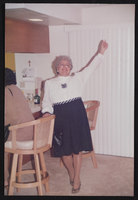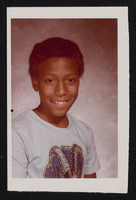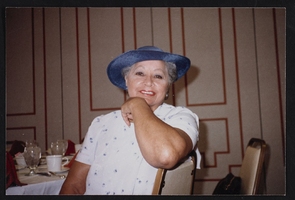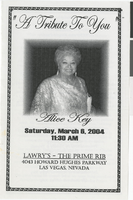Search the Special Collections and Archives Portal
Search Results
Alice Key Papers
Identifier
Abstract
The Alice Key Papers (1936-2004) consist of documents detailing Alice Key’s life and work in the African American community, historic preservation, and labor relations in Las Vegas, Nevada. Included in the collection are awards and certificates documenting Key’s achievements, invitations and programs to events, political and civic correspondence, and magazine and newspaper articles both about Key and written by her. The collection also contains photographs.
Archival Collection
Alice Key Photograph Collection
Identifier
Abstract
The Alice Key Photograph Collection (1930s-1990s) is comprised of color and black-and-white photographic prints of activist, dancer, and journalist Alice Key with family, friends, political figures, and performers. Materials include photographs of Senator Howard Cannon, Louis Armstrong, and Bill Robinson, and signed professional head shots. Also pictured are Key's coworkers and unidentified performers.
Archival Collection

Alice Key: photographic print
Date
Archival Collection
Description
Image
Alice Key oral history interview
Identifier
Abstract
Oral history interview with Alice Key conducted by Claytee D. White on February 17 and March 24, 1997 for the Women's Research Institute of Nevada (WRIN) Las Vegas Women Oral History Project. In this interview Alice Key discusses being a chorus line dancer at the Cotton Club in Culver City, California and then moving to Las Vegas, Nevada after her dancing career ended. She then talks about working as a reporter, her involvement with the civil rights movement in Las Vegas, and creating the first all-black television show in the country: Talk of the Town.
Archival Collection

Alice Key's grandson Aaron: photographic print
Date
Archival Collection
Description
Image
Alice Key oral history interview
Identifier
Abstract
Oral history interview with Alice Key conducted by Claytee D. White, with Joyce Moore and two unidentified individuals on November 11, 2004 for the African Americans in Las Vegas: A Collaborative Oral History Project. In this informal interview, Key talks about her early education, sharing anecdotes along with more serious comments. She continues talking about her early activism, beginning with housing discrimination in Los Angeles, California, the work of President Lyndon Johnson on equal rights, her work on the Clark County Nevada Economic Opportunity Board, and the issue of hiring Black front-of-house employees at the casinos and hotels. She continues chatting about families who own or owned casinos in Las Vegas, different church leaders in the city, and ends talking about early Black entertainers, including Dorothy Dandridge and the Barry Brothers and her own experiences as a dancer.
Archival Collection
Alice Key oral history interview
Identifier
Abstract
Oral history interview with Alice Key conducted by Claytee D. White on August 16, 2007 for the African Americans in Las Vegas: a Collaborative Oral History Project. In this interview, Key talks about her birth in Kentucky, upbringing in Riverside, California, high school graduation in 1928 and enrollment at UCLA. She describes at length her entry into the entertainment business as a dancer in 1929, her work and travels with dance companies, and her decision to retire in 1937. She continues discussing the roots of her political activism in Los Angeles, her journalism career, her work to end restrictive covenants, racism in Hollywood hiring, and poor representation for Black dancers in the industry. She then explains what prompted her move to Las Vegas, Nevada in 1954 and describes the levels of racism and inequality in Las Vegas during this period. She remarks on many notable Las Vegas leaders, including Dr. Charles West, Dr. James McMillan, Mabel Hoggard, Woodrow Wilson, and others. She also discusses the role of the NAACP, her work as a deputy registrar of voters, and creating the first all-Black television show in the country: Talk of the Town.
Archival Collection

Alice Key at Barbara Jordan's luncheon: photographic print
Date
Archival Collection
Description
Image
Alice Key: photographic print, undated
Level of Description
Archival Collection
Pagination
- Previous page ‹‹
- Page 8
Archival Component

